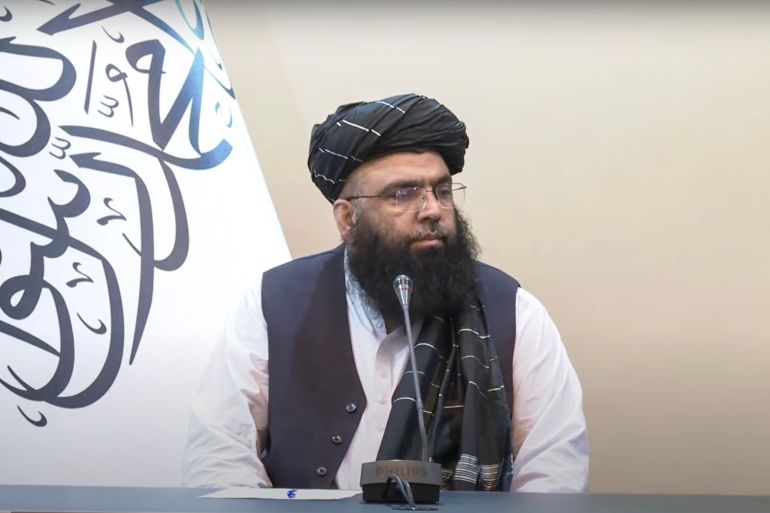Who’s Maulvi Abdul Kabir, Afghanistan’s new Taliban-appointed PM?
Kabir has been associated with Taliban leadership since 2006, when Mullah Omar appointed him as a military commander.

Afghanistan’s Taliban rulers have appointed Maulvi Abdul Kabir, who played a key role in the 2020 Doha Agreement with the United States, as the country’s new caretaker prime minister, a senior official of the group confirmed to Al Jazeera.
Kabir has replaced Mullah Mohammad Hasan Akhund, 78, who had been in charge of the interim government since the group seized control of the country in August 2021.
Keep reading
list of 4 itemsTaliban top spokesman asked to work from Kandahar
Report says donors ‘turning away’ from Taliban-ruled Afghanistan
Afghanistan universities reopen but women still barred by Taliban
The 60-year-old leader has been under United Nations sanctions since 2001, when he served as the acting prime minister of the then Taliban regime (1996-2001). He took shelter in Pakistan after the Taliban government was toppled in a US-led invasion in 2001.
“He [Akhund] has been unwell for a few weeks and hence been replaced by Kabir until he recovers,” Sohail Shaheen, the head of Taliban’s political office in Doha, said on Wednesday.
Earlier, Zabihullah Mujahid, the spokesman of the Islamic Emirate of Afghanistan, as the Taliban government refers to the country, said Kabir’s appointment was part of the routine governance process as Akhund is under treatment and needed rest.
Kabir, who hails from the Zadran tribe of Pashtun ethnicity, served as a political deputy to Akhund before his elevation on Wednesday.
Taliban leaders have denied the change was due to an internal rift. Last month, Mujahid was asked to divide time between Kabul and Kandahar, triggering speculation about an internal power struggle. Taliban has denied them.
History as a high-ranking Taliban leader
Kabir’s appointment came through a special decree by the Taliban’s supreme leader Hibatullah Akhunzada, the group’s secretive de facto leader.
The 60-year-old was born in the northern Baghlan province 262 kilometres (162 miles) north of the Afghan capital, Kabul. He has held crucial positions in previous and current Taliban governments and was part of the Taliban Doha political office that negotiated the agreement with Washington that paved the way for the US troops’ withdrawal from Afghanistan after 20 years of war.
His first appointment came in 1996 as the governor of the Nangarhar province along the country’s eastern border adjoining Pakistan. The province was among the centres of power for the group during its first reign and continued to be a stronghold during the 20-year occupation by the US.
Taliban’s founder Mullah Omar handpicked Kabir for the role and appointed him to the group’s high leadership council.
The United Nations Security Council listed Kabir as a sanctioned person in January 2001 for his concurrent roles in the first Taliban regime as the second deputy of economic affairs, member of the council of ministers, governor of the Nangarhar province, and head of the eastern zone.
In July 2005, Kabir was among a group of Taliban leaders that was arrested by Pakistani intelligence agents during raids against the group in northwest Pakistan. However, there are conflicting reports about the date of his arrest.
Appointment devoid of ‘decision-making rights’
Since the Taliban’s return to power in 2021, Kabir has played a crucial role in negotiating with the US leadership during talks in Doha.
Delegates from both sides have held talks in the Qatari capital focusing on security and “terrorism” concerns, the rights of women and girls, as well as evacuations from Afghanistan.
Analysts say his diplomatic acumen and ability to negotiate with countries that are at odds with the Taliban could have been one of the factors behind his appointment.
“Given Abdul Kabir’s closeness to Pakistan and role in the Doha talks, the Taliban could be looking to smoothen relations with foreign countries,” Arif Rafiq, a political risk adviser on South Asia, told Al Jazeera.
“But a change in a single executive position isn’t enough to signal groundbreaking changes in domestic and foreign policy,” he said.
The Taliban remains isolated, with no country recognising its government. The group has urged the US and other Western nations to lift sanctions slapped in the wake of its military takeover of the country, which Washington said was a violation of the 2020 Doha Agreement. The US has also called on the Taliban administration to be more inclusive and lift curbs on women – a demand the Taliban has called meddling in its internal affairs.
The talks between the Taliban and Western diplomats have borne little results as the group has increased its curb on women’s rights, banning women’s education and freedom to work.
Girls’ secondary schools were supposed to reopen last March, but the Taliban rescinded the directive forcing millions of teenage girls out of the school system. The Taliban has also barred women from seeking higher education and working with international NGOs.
It argues its rules are in keeping with its interpretation of Islam, although Afghanistan is the only Muslim country that prohibits girls from being educated.
Faiz Zaland, a lecturer at Kabul University, said a change in policy on women’s rights cannot be expected as Kabir’s appointment is temporary and devoid of “decision-making rights”. He added that Kabir will not have a “substantial influence” on the group’s future foreign policies.
US-based analyst Rafiq also emphasised that the “concentration of power” lay with Kandahar-based Akhunzada, who makes policy decisions on the rights of girls and women, including on education.
“Meaningful policy changes will only take place if Kabir’s appointment is part of a broader set of concessions to the Taliban factions, who take a comparatively more accommodating position on social issues,” he said.
Several senior Taliban leaders have voiced their concerns against the ban on women’s education, saying Islam guarantees women’s rights to education and employment.